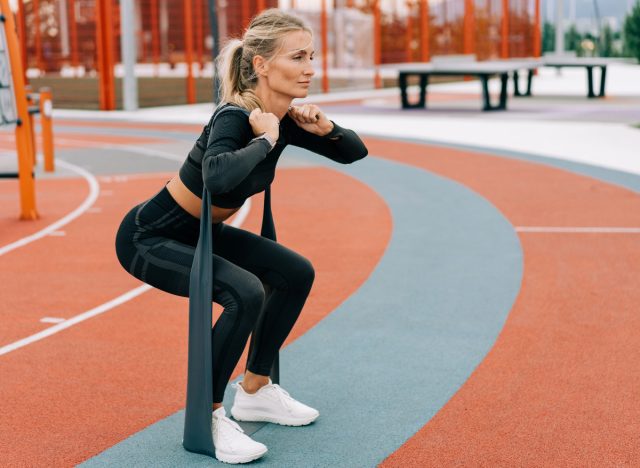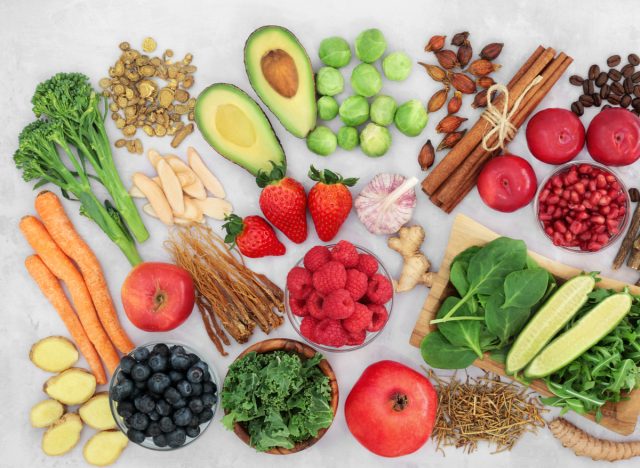By now, you’re likely well aware that there’s no magic elixir or just one exercise you can do to build a leaner, stronger body overnight. It all comes down to embracing a well-rounded approach and turning to science. The simple science behind losing weight and sculpting lean muscle is “energy in versus energy out,” says Sasha Mihovilovic, NASM-CPT and master trainer for AKT. From diet to exercise, Mihovilovic breaks down some of the best ways to get a leaner body right now.
“Energy balance comes down to a singular idea: All calories must be accounted for through the principle of thermodynamics,” Mihovilovic explains. “Thermodynamics describes the relationship between heat and energy and how these are converted into one another. Thermodynamics explains how energy is transferred from one place to another and from one form to another.” For instance, when you eat more calories than you expend, energy is “stored.” When you expend a greater number of calories than you take in, energy is “lost.”
“If you are looking to ignite a change in your body, for a period of time, you would need to work from a place of expending more energy and creating a slight deficit with energy consumed,” Mihovilovic stresses. Below are six of the best ways to get a leaner body. Read on to learn more, and when you’re finished, be sure to check out People Swear by the 30/30/30 Plan for Weight Loss: ‘Completely Changed My Body’.
Cardio

When you want to drop weight, aerobic exercise is an excellent place to begin. Research shows that regularly performing cardio is a safe and effective road to weight loss.
“Incorporating increased physical activity that incorporates raising your heart rate can also cause you to burn more calories throughout the day—aka, boosting your metabolism,” Mihovilovic tells us. “Incorporating into your routine a portion of your workout or daily activities (playing with your kids, gardening, jogging with your dog) where you are breathing consistently at a higher rate than when you are resting, you know you are getting your cardio in!”
Strength training

Performing resistance exercises—or strength training—with your body weight, resistance bands, dumbbells, kettlebells, etc., puts stress on your body. This enhances the ability of your bones, muscles, and connective tissue to “react to outside influences,” says Mihovilovic.
“Strength training builds lean muscle, contributing to an increased metabolism, ultimately resulting in higher reductions of fat,” Mihovilovic adds. “By building lean muscle, we can increase the metabolism because your body requires more energy to sustain and use that muscle. So, you burn more calories both during the workout and after (for muscle recovery).”
Hydrating

Drinking plenty of water throughout the day is so important to your overall health and weight loss efforts. “If you are increasing physical activity more than usual, as you sweat more, it’s so important to up your H20 intake, more than you did before,” Mihovilovic stresses. “If you are dehydrated, functions in your bodily functions will be less efficient, and it will be more difficult to reach your goals!”
Following an anti-inflammatory diet

As with any new diet or exercise regimen, it’s important to first speak with a healthcare professional, registered dietitian, or certified personal trainer to ensure it’s the best option for you. There are plenty of crash diets and food trends out there that make it challenging to determine what works and what doesn’t.
“If you are cleared by a doctor to make changes in your diet, what I always recommend for anyone, is to start with a diet that is focused on whole foods that are anti-inflammatory, and minimizing processed foods/beverages,” Mihovilovic says. “Eating a diet that is anti-inflammatory can promote a healthy gut microbiome and slow down digestion to prevent spikes in blood glucose.”
Rather than focusing on what you can’t eat, prioritize what you can! Mihovilovic put together an “easy-to-shop” anti-inflammatory foods list to bring on your next grocery store run. These items include olive oil, blueberries, strawberries, oranges, cherries, tomatoes, leafy greens (kale, spinach, collard greens, etc.), walnuts, almonds, and fatty fish. “To make shopping for anti-inflammatory foods fun, try shopping at your local farmers market so you can easily stay away from the processed food options and on top of that support local businesses,” Mihovilovic adds.
Prioritizing sleep and recovery

When you’re sleeping and recovering, it may not seem like you’re being proactive in your weight loss efforts—but this part of the process is crucial. “All of the above tips will be for practically nothing if you aren’t recovering, resting, and sleeping well,” Mihovilovic explains. “Think of it as ‘work hard, recover harder.’ Sleep is an essential component of muscle recovery. While you sleep, your body undergoes several physiological changes that help with the repair and recovery of damaged tissues.”
To create the ideal sleep environment, consider sticking to a consistent bedtime schedule. In addition, make sure your room is cool, dark, and quiet, and power down any blue light devices long before you hit the sheets.
Being consistent

Last but not least, consistency is king when you’re working toward any goal. “Aim to stop thinking short-term, because it’s inevitable that the short-term plan will crash and burn,” says Mihovilovic. “What are the small steps that you can take that can lead to long-term consistency?”
Three of Mihovilovic’s helpful tips that can set you up for success include: starting small and building over time, asking for help from a certified trainer or registered dietitian, and choosing workouts or modalities you genuinely enjoy.

